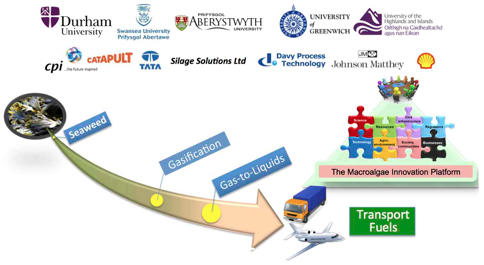MacroBioCrude Consortium
MacroBioCrude Consortium
MacroBioCrude

The MacroBioCrude consortium lead by Phil Dyer (Centre for Sustainable Chemical Processes, Durham Chemistry, and Royal Society Industry Fellow) supported by Mike Theodorou has received EPSRC funding (£2.3M) to support a cross-discipline project to establish an integrated supply and processing pipeline for the sustainable manufacture of liquid hydrocarbon fuels from seaweed (or macroalgae). MacroBioCrude brings together both researchers from five universities, Durham (Chris Greenwell – Earth Sciences; Victoria Wells – Business School), Aberystwyth (Joe Gallagher – Institute of Biological, Environmental and Rural Studies), Swansea (Robin Shields – Centre for Sustainable Aquaculture Research), Greenwhich (Pat Harvey, Bioenergy/Life Sciences) and Highlands and Islands (Alan Bourhill – Marine Science and Technology), as well as industrial partners Johnson Matthey Catalysts, Davy Process Technology, Silage Solutions Ltd, Shell, CPI and CPI/Tata Steel.

The team will explore methods of seaweed gasification and upgrading to diesel and aviation kerosene employing a novel biomass preservation technology developed by members of the consortium. In parallel, they will establish an innovation platform for this novel bio-fuel supply chain, which assesses the overall process footprint, supply chain relationships and public/end-user perceptions. Seaweed makes an ideal sustainable feedstock to contribute to the manufacture of high energy density liquid transport fuels since it does not compete with foodcrops for land or water, has a rapid growth cycle combined with a high solar efficiency (~3 times greater than terrestrial biomass), and can be grown alongside other water-based activities such as off-shore wind farms and fish farms.The consortium was initially formed via the IAS Biofuels, Science and Society theme and is a great example of Durham interdisciplinary work and the role the IAS can play in stimulating this.

Recent information from the Durham team on using seaweed as a sustainable chemical feedstock can be found in two of their recent articles:
- “Thermochemical processing of macroalgae: a late bloomer in the development of third-generation biofuels?” by Phil Dyer, Chris Greenwell, Mike Theodorou and Jack Rowbotham at www.future-science.com/doi/abs/10.4155/bfs.12.29
- “Copper(II)-mediated thermolysis of alginates: a model kinetic study on the influence of metal ions in the thermochemical processing of macroalgae” by Jack Rowbotham, Phil Dyer, Chris Greenwell, David Selby, and Mike Theodorou at rsfs.royalsocietypublishing.org/content/3/1/20120046.abstract

